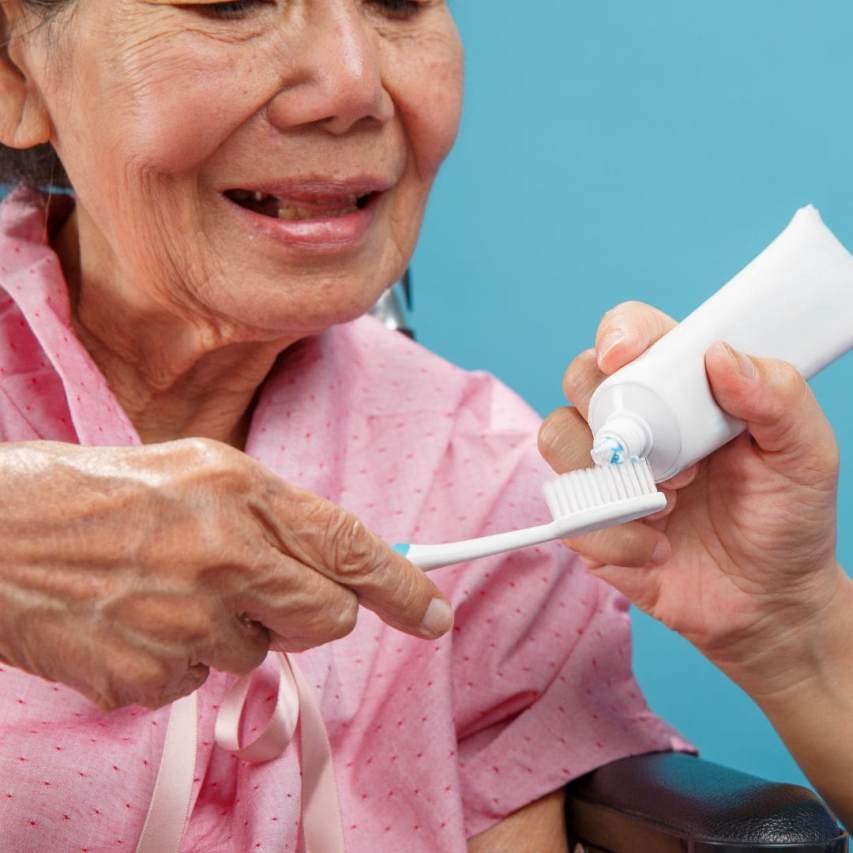Elderly Dental Care
Oral healthcare directly affects the overall health and quality of life of people of all ages, especially seniors. However, maintaining good dental health becomes ever more challenging as we age. Medical conditions like arthritis can make brushing and flossing more difficult; cognitive issues may cause forgetfulness; lack of access to transportation and financial difficulties may delay or prevent needed dental care.
Yet, it is vital to prioritize regular dental care since untreated dental problems put seniors at higher risk of serious illnesses such as diabetes and heart disease, as well as more common oral health problems; including toothaches, gum disease and tooth loss.
The latter occurs more frequently among the elderly because, with aging, tooth enamel begins to wear away, making teeth more susceptible to damage and decay. This can lead to gum disease, tooth loss and jawbone resorption.
Here are a few examples of the impact that dental problems can have on general health:
Gum Disease
Severe gum disease, also called periodontitis, can lead to sore and bleeding gums, chewing problems, tooth loss and other health problems, including heart disease. Immediate treatment and attention are very important.
If left untreated, the gums begin to separate from the teeth and form pockets where food particles may collect and more plaque forms. Advanced gum disease can eventually destroy supporting structures for the teeth, leading to tooth loss.
Heart Disease and Stroke
There is a solid connection between oral and cardiovascular health. The bacteria causing gum disease can travel through the bloodstream into the inner layer of the heart. This narrows the blood flow when the arteries begin to swell in response to bacterial infections and increases the risk of a stroke or heart attack.
Respiratory Disease / Pneumonia
The bacteria present in gum disease can also reach the lungs and severely affect the respiratory system, causing existing lung conditions to worsen or lead to new lung infections or severe pneumonia.
Diabetes
Periodontitis can affect the body's ability to regulate insulin levels. This can affect blood sugar levels and lead to more serious diabetic complications creating life-threatening situations related to poorly controlled glucose levels.
Dry Mouth
Older adults typically experience a reduced saliva production, leading to dry mouth. A dry mouth can cause significant oral health problems, including loosened dentures, tooth decay and trigger gum disease.
Tooth Root Decay
Root decay is common in older adults and is due primarily to gums receding naturally with age and a diet that includes acidic foods. When gums recede, the root becomes increasingly exposed to mouth bacteria that contributes to their decay.
Shifting teeth
When seniors lose teeth and do not have them replaced with implants, the jawbone starts to deteriorate and causes the surrounding teeth to shift into open spaces. This results in an uneven jawbone, potentially leading to severe bite and appearance concerns.
Oral Cancer
Older adults are at higher risk for oral cancers. In fact, the median age for diagnosis is 62. The risk is higher for people who chew tobacco or smoke cigars, cigarettes or pipes.
Preventive oral health with elderly dental care:
Despite the serious health complications that can result from neglecting needed dental hygiene, maintaining a high level of oral health does not have to be complicated for seniors.
The following are some basic recommendations to ensure adequate preventive oral care:
Brush your teeth twice daily using a soft-bristled toothbrush, but use an electric brush if arthritis is an issue.
Follow up with daily flossing to ensure that the spaces between your teeth that brushing cannot reach have been adequately cleaned.
Remember to clean your full and partial dentures daily and to remove them at night. This will eliminate the possibility of bacterial infection from your dentures and improve the circulation of saliva to all areas of your mouth.
Use an antibacterial mouthwash to kill bacteria and freshen your breath. Look for a mouthwash that contains fluoride to help prevent cavities.
Stop smoking.
And:
Don't forget to visit your dentist for regular dental cleaning and exams, even if you have dentures.


